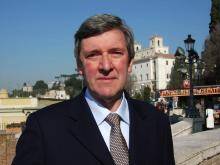Pope Francis believes in people power. He believes in the ability of ordinary people to bring about significant change in the world today.
He stated this clearly in an hour-long talk, entirely written by him, to the second World Meeting of Popular Movements at Santa Cruz, during his visit to Bolivia. Addressing representatives of thousands of movements, he declared that change is urgently needed in the world today and told them, “You are sowers of change!”
Then, in words that brought thunderous applause, he said: “The future of humanity does not lie solely in the hands of great leaders, the great powers and the elites. It is fundamentally in the hands of peoples and in their ability to organize. It is in their hands, which can guide with humility and conviction this process of change.”
When the applause died down, he added, “I am with you!” This is typical of the man who as archbishop of Buenos Aires did not hesitate to give public backing to a nongovernmental organization engaged in combatting human trafficking. As pope he has relentlessly continued that effort, aided by the Pontifical Council for Justice and Peace and the Pontifical Academy for Social Sciences, seeking to engage ever wider sectors of society within and outside the Catholic Church.
Francis has sought to encourage grassroots movements and organizations worldwide in their efforts to improve the lives of millions of people who live in poverty and misery. For this reason he asked the Pontifical Council for Justice and Peace to convene the first World Meeting of Popular Movements, and spoke at that gathering in the Vatican in October 2014. Then at Santa Cruz, addressing their second World Meeting, he not only praised their global struggle to ensure a home, work and land—“sacred rights”—for the many millions that lack these. He also urged them to join together in common action to protect “Mother Earth.”
For more than half a century popes have expressed varying degrees of support for the movements and organizations of civil society, but Francis is the first pope to give them total backing and encouragement. He is convinced that the Holy Spirit is active in these movements too, and that they can bring about substantial change in the world, including structural change in the economy.
In the encyclical “Laudato Si’,” he seeks to mobilize people at different levels of society, as well as the popular movements, to respond to climate change by working for a truly human ecology that cares and protects both people and the created world. He has tried to mobilize bishops worldwide for this cause too. A significant number on all continents are responding enthusiastically, but many have yet to join in. If they all respond, the impact could be great indeed.
Among the follow-up initiatives to the encyclical, Francis had the Pontifical Academy for Social Sciences invite mayors of large cities to the Vatican to discuss how best to promote sustainable development and protect “our common home.” Over 60 attended the event (July 21-22) from many countries, including the United States. Francis interrupted his vacation to come and address them.
While attempting to influence world leaders, Francis is at the same time working to mobilize people at the grassroots level in the hope that they can push governments to take courageous decisions at the forthcoming U.N. summit meetings on sustainable development goals (in New York in September) and climate change (in Paris in November-December). Aware that past summits failed in this respect under pressure from vested economic interests, he is doing what he can to ensure the same does not happen again.
Hence he issued a call to action at the Santa Cruz meeting, saying: “We cannot allow certain interests—interests which are global but not universal—to take over, to dominate states and international organizations, and to continue destroying creation. People and their movements are called to cry out, to mobilize and to demand—peacefully but firmly—that appropriate and urgently needed measures be taken. I ask you, in the name of God, to defend Mother Earth.”
Saying the Catholic Church “cannot remain aloof from this process,” he called on local churches worldwide to join hands with the popular movements in this struggle.








